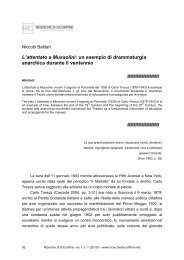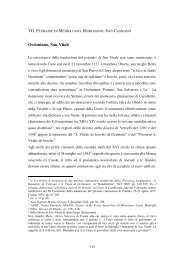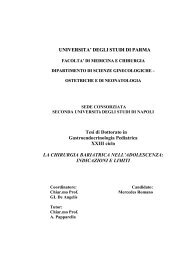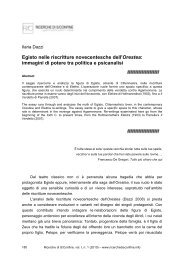Mystery shoppers test the reference service in a public library
Mystery shoppers test the reference service in a public library
Mystery shoppers test the reference service in a public library
You also want an ePaper? Increase the reach of your titles
YUMPU automatically turns print PDFs into web optimized ePapers that Google loves.
<strong>Mystery</strong> <strong>shoppers</strong> <strong>test</strong> <strong>the</strong> <strong>reference</strong> <strong>service</strong> <strong>in</strong> a <strong>public</strong> <strong>library</strong>.<br />
Reasons, methods and results.<br />
Prof. Ingeborg Simon, simon@hdm-stuttgart.de<br />
Maria Bertele, mb138@hdm-stuttgart.de<br />
Solveig Müller, sm088@hdm-stuttgart.de<br />
Ilona Obermeier, io002@hdm-stuttgart.de<br />
Ute Zelch, uz005@hdm-stuttgart.de<br />
Stuttgart Media University<br />
Campus Stuttgart City<br />
Faculty Information and Communication<br />
Wolframstraße 32<br />
70191 Stuttgart<br />
Abstract<br />
The <strong>reference</strong> <strong>service</strong> is becom<strong>in</strong>g a market<strong>in</strong>g tool for libraries which should be used,<br />
verified and improved. One way to evaluate this <strong>service</strong> is <strong>the</strong> method of “mystery shopp<strong>in</strong>g”,<br />
which allows to <strong>test</strong> <strong>the</strong> quality of <strong>the</strong> <strong>reference</strong> <strong>service</strong> and <strong>in</strong> particular <strong>the</strong> quality of<br />
<strong>in</strong>teraction at <strong>the</strong> <strong>service</strong> desk. The results show <strong>the</strong> need for quality improvements. Quality<br />
can be improved for example by provid<strong>in</strong>g tra<strong>in</strong><strong>in</strong>g to enhance communication skills, by<br />
rearrang<strong>in</strong>g <strong>the</strong> <strong>service</strong> desks and by develop<strong>in</strong>g quality standards for <strong>the</strong> <strong>reference</strong> <strong>service</strong>. It<br />
is essential to evaluate after a certa<strong>in</strong> period of time to what extend <strong>the</strong>se activities have<br />
improved quality. A German city <strong>library</strong> had already implemented measures of this k<strong>in</strong>d to<br />
enhance <strong>the</strong> quality of its <strong>reference</strong> <strong>service</strong>. In 2009, <strong>the</strong>y delegated Prof. Ingeborg Simon to<br />
accomplish this second evaluation of <strong>the</strong> <strong>library</strong>`s <strong>reference</strong> <strong>service</strong> with a team of five<br />
students from Stuttgart Media University`s master`s program of <strong>library</strong> and <strong>in</strong>formation<br />
management.<br />
The paper expla<strong>in</strong>s <strong>the</strong> evaluation method of “mystery shopp<strong>in</strong>g” <strong>in</strong> detail and reflects <strong>the</strong><br />
experiences ga<strong>in</strong>ed dur<strong>in</strong>g its implementation. Emphasis is placed on outl<strong>in</strong><strong>in</strong>g <strong>the</strong> method<br />
and its great potential to enhance <strong>the</strong> quality of <strong>reference</strong> <strong>service</strong>s.<br />
Reasons - Why should we evaluate <strong>the</strong> <strong>reference</strong> <strong>service</strong>?<br />
Ten years ago while visit<strong>in</strong>g <strong>the</strong> United States of America, some of <strong>the</strong> libraries – very new<br />
modern libraries - were ra<strong>the</strong>r empty. There were a lot of <strong>reference</strong> desks – but <strong>the</strong> <strong>reference</strong><br />
librarians were sitt<strong>in</strong>g <strong>the</strong>re ra<strong>the</strong>r lonesome. This wasn’t just <strong>the</strong> case <strong>in</strong> <strong>public</strong> libraries;<br />
statistics of research libraries have shown this tendency for <strong>the</strong> last 10 years (Tennant, 2000).<br />
Librarians expla<strong>in</strong> this situation with <strong>the</strong> keen competition from <strong>the</strong> <strong>in</strong>ternet. Therefore<br />
librarians demanded to f<strong>in</strong>d ways to stop this development – <strong>in</strong> order to survive.<br />
The <strong>reference</strong> <strong>service</strong> is one field where librarians can stop this development. As people<br />
believe <strong>the</strong>y are able to get most of <strong>the</strong>ir needed <strong>in</strong>formation via “Google”, librarians have to<br />
conv<strong>in</strong>ce <strong>the</strong>m of <strong>the</strong> advantage of <strong>the</strong> research done by librarians and of <strong>the</strong> results received<br />
by <strong>library</strong> professionals. And fac<strong>in</strong>g <strong>the</strong> fact that more and more <strong>public</strong>ations are digital and<br />
can be achieved by remote access, <strong>the</strong> <strong>reference</strong> <strong>service</strong> should be one of <strong>the</strong> essential reasons<br />
why people contact <strong>the</strong> librarians.<br />
This means that librarians should do <strong>the</strong>ir best to improve this <strong>service</strong> cont<strong>in</strong>uously. But first<br />
we needed to know what exactly should be improved – and this can be learned by evaluat<strong>in</strong>g<br />
<strong>the</strong> <strong>reference</strong> <strong>service</strong>.

















